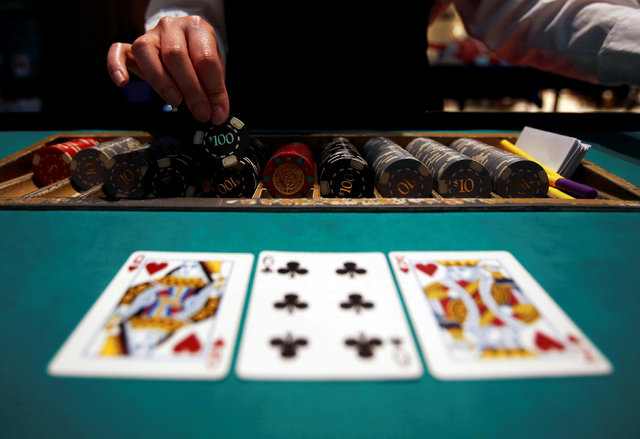UNLV gaming research may influence decisions on Japan casinos
Two reports issued by UNLV’s International Gaming Institute may influence Japanese lawmakers next year when they begin sifting through the issues of developing full-scale casino resorts in Japan.
What the Japanese Diet concludes in its legislation will be critical to several Las Vegas casino companies in the running to build one or more resorts in Japan.
Caesars Entertainment, Las Vegas Sands, MGM Resorts International and Wynn Resorts, as well as a handful of foreign and other domestic companies, already have invested millions of dollars in travel, personnel, lobbying and planning in advance of decisions that some say could produce an industry with $25 billion in annual revenue.
Japanese government officials and business leaders commissioned research from UNLV’s Bo Bernhard, Brett Abarbanel and Jennifer Roberts as well as Kahlil Philander of Washington State University in two reports to guide their nation in launching Japan’s first so-called full-scale resorts, where casinos complement convention facilities, entertainment, luxury retail and fine dining.
The two reports, presented to Japanese stakeholders in September, were made public earlier this month.
Two reports
The 100-page “Socio-Economic Impacts of Japanese Integrated Resorts” was completed Sept. 2 and offers recommendations on lawmakers’ key policy decisions.
The supplemental 31-page “Practical Perspectives on Gambling Regulatory Processes for Study by Japan: Eliminating Organized Crime in Nevada Casinos” completed Aug. 25 gives more information on how Nevada’s resort community grew from casinos dominated by organized-crime figures to the highly regulated corporate enterprise it is today.
The first report is a socioeconomic analysis of the impacts of a full-scale casino resort, with emphasis on Japan’s goals, including balancing between growing the Japanese tourism market while minimizing the social costs of addictive behavior and crime.
The second report examines how gaming regulation can help Japan eliminate organized crime in casino management, viewed as a key first step for a new casino jurisdiction. The report suggests rigorous standards in pre-licensing background investigations, post-licensing enforcement, internal controls and compliance practices similar to those in Nevada.
December approval
Bernhard, director of the institute, has visited Japan over the past five years, watching the process of the government enabling casino gambling. The nation took a major step toward approval in December by passing legislation establishing a framework for allowing resorts.
The U.S.-Japan Business Council requested UNLV researchers to provide information and during the summer, Abarbanel, Roberts and Philander traveled to Tokyo to complete research.
In September, they presented their findings at a summit to an overflow crowd of stakeholders that included more than 400 politicians, industry leaders, problem gambling clinicians and health officials working in the treatment of addictive behavior.
“Now that they have, in fact, made that first step, the interest has only increased,” Abarbanel said in an interview about the huge turnout at their presentation.
‘Deliberate and thoughtful’
She said Japan is being “deliberate and thoughtful” in its deliberations about what they intend to include in an implementation bill expected to be considered by the second or third quarter of 2018.
Among the issues awaiting resolution in the implementation bill are how many resorts could be built, where they would be located and whether there would be restrictions on casino sizes or policies on casino admission. Legislation could also address requirements on responsible gambling programs and whether foreign casino companies would have to partner with a Japanese business.
Japan’s provision of free public health care is a reason why the focus on responsible gambling programs is so important. Historically, the Japanese have seen addictive behavior patterns through pachinko play, so it’s an emphasis in the area of public health, Abarbanel said.
Roberts, associate director of the International Center for Gaming Regulation, pointed out that casino companies already have customer databases, compliance programs, credit and collection systems and anti-money laundering mechanisms already in place, but that Japanese companies could provide other advantages to a resort since local residents could be more familiar with them than the foreign operators.
Partnerships
Philander, who formerly was at UNLV and is now an assistant professor in Washington State’s School of Hospitality Business Management, said Las Vegas companies could benefit from a partnership with a Japanese operation.
“One thing that’s worth considering … local (Japanese) firms still may have an advantage in some way, shape or form based on the nature of their presence in the market and any consumer databases they may have and the brand value they may already hold,” he said. “Sega Sammy has a strong brand, it appears in many of these markets that are being considered. Even if they don’t have direct experience in running, developing or building an integrated resort, they still might have some assets, brands or connections to players that would be useful for a partnership or some other type of joint venture.”
The UNLV report said Japan would benefit by maximizing the effects of international tourism on the Japanese economy, which has led the researchers to conclude that Osaka, Tokyo and Yokohama are the locations best suited for resorts.
The Review-Journal is owned by the family of Las Vegas Sands Corp. Chairman and CEO Sheldon Adelson.
Contact Richard N. Velotta at rvelotta@reviewjournal.com or 702-477-3893. Follow @RickVelotta on Twitter.
Who will win?
UNLV researchers said they aren't in a position to handicap whether any Las Vegas company has an inside track on being selected to develop in Japan.
"I know that many of the major stakeholders definitely have interest and are pursuing it with resources, but as far as one having priority, I haven't heard anything," said Jennifer Roberts, associate director of the International Center for Gaming Regulation.
The UNLV report also recommends against adopting a particular gaming industry model already in place, reasoning that different markets have different characteristics. Some Japanese policymakers have gravitated toward Singapore's gaming model, which charges admission to local residents to play and limits the number of casinos to two.
Some lawmakers want to limit Japanese casinos to the size of Singapore's, a proposal critics say wouldn't work because of the vast difference in the population base between Tokyo and Singapore and the higher cost of land and construction in Japan.
Richard N. Velotta Las Vegas Review-Journal




























